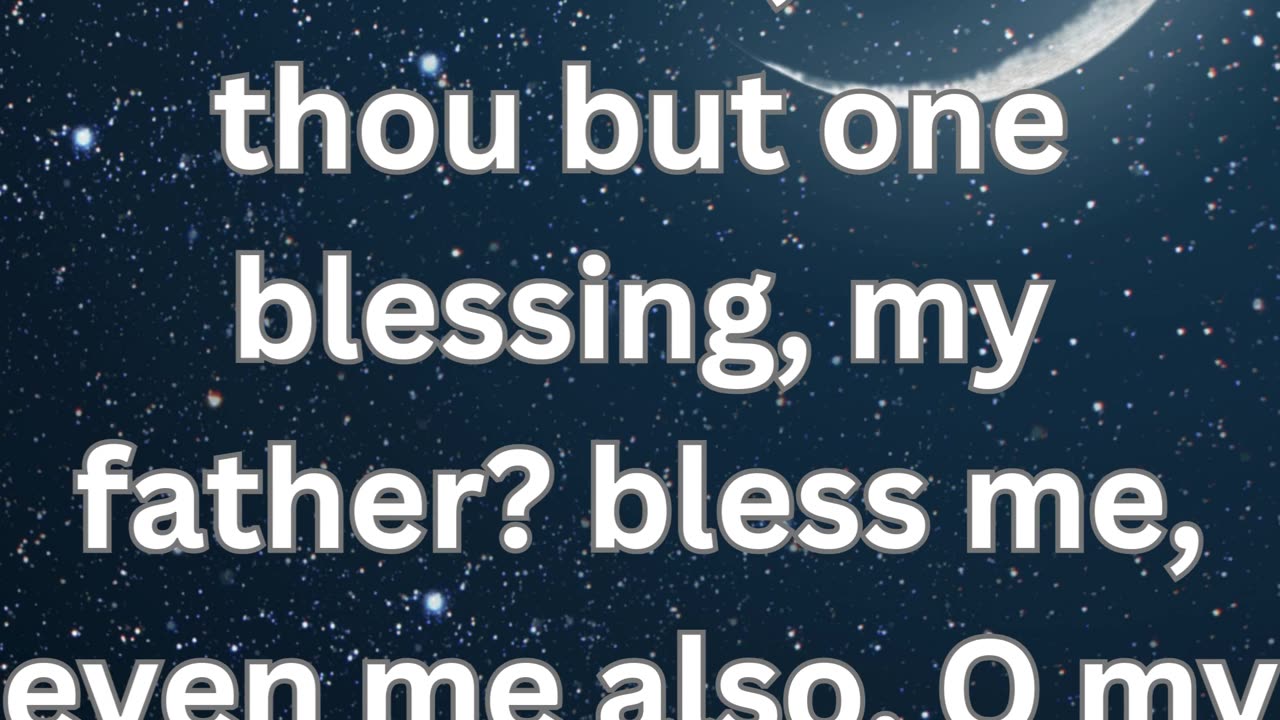Premium Only Content

"Esau's Desperate Plea for Blessing" Genesis 27:38.
Genesis 27:38 - "Esau's Desperate Plea for Blessing"
Context and Background:
Genesis 27 narrates a pivotal moment in the biblical story of Isaac's family. Isaac, the son of Abraham, intends to bestow his blessing upon his eldest son, Esau. However, through a series of deceptive actions orchestrated by his wife Rebekah and their younger son Jacob, Isaac ends up giving the blessing to Jacob instead.
In ancient Hebrew culture, a father's blessing carried immense significance. It was not just a verbal affirmation but a formal, spiritual bequeathal that conferred the favor of God, leadership within the family, and the promise of prosperity. This was especially true for the patriarchs, whose blessings were seen as carrying divine promise and covenant.
Verse Description:
Genesis 27:38:
"Esau said to his father, 'Have you only one blessing, my father? Bless me, even me also, O my father.' And Esau lifted up his voice and wept."
In this verse, Esau's anguish is palpable. Having just learned that his younger brother Jacob has deceitfully received the blessing meant for him, Esau is devastated. His plea to Isaac, his father, underscores a profound sense of loss and desperation. He is not merely asking for another blessing; he is expressing a heart-wrenching cry for validation and hope in the face of what feels like a total betrayal and an irreversible loss.
Key Themes:
Desperation and Loss: Esau’s plea reveals the depth of his despair. The blessing he missed was more than just words; it represented his inheritance, his future, and his father’s favor. His loud, tearful cry reflects his profound sense of loss.
Paternal Blessing's Irreversibility: The verse highlights the perceived finality and unique nature of a patriarchal blessing in the ancient context. Esau's repetition of the request and his weeping underline the magnitude of what has been taken from him and the cultural weight of the blessing.
Sibling Rivalry and Betrayal: This verse is the culmination of a long-standing rivalry between Jacob and Esau. The deceitful acquisition of the blessing by Jacob brings their conflict to a boiling point, emphasizing themes of betrayal and family discord.
Divine Providence and Human Agency: The broader narrative of Genesis 27, including this verse, raises questions about divine providence and human actions. While Jacob’s deceit is clear, the story also suggests that these events are part of a larger divine plan, complicating the moral and theological implications.
Reflection and Application:
Esau's response in Genesis 27:38 invites reflection on how we cope with disappointment and injustice. It speaks to the human experience of deep emotional pain and the need for affirmation and hope even when circumstances seem unfair and beyond our control.
In a broader sense, this verse encourages readers to consider the implications of their actions, the dynamics of family relationships, and the role of faith in navigating life’s challenges. It also serves as a reminder of the complexities of divine promises and human responsibility.
Visual and Emotional Imagery:
Imagining Esau, a robust hunter, reduced to tears, creates a striking image of vulnerability and sorrow. His plea for any remaining blessing from his father symbolizes a universal cry for love, acceptance, and a future, resonating deeply with anyone who has faced significant loss or felt overlooked.
In literature, art, and personal reflection, Esau’s cry, "Have you only one blessing, my father?" captures the essence of a heart seeking solace and significance amidst betrayal and loss.
-
 DVR
DVR
Nerdrotic
7 hours ago $37.32 earnedWoke Hollywood TERRIFIED! GLICKED: Gladiator 2 & Wicked REVIEW | Friday Night Tights 329 w/ Metatron
114K37 -
 LIVE
LIVE
SoundBoardLord
3 hours agoFriday Night Fever!!
314 watching -
 56:36
56:36
Sarah Westall
5 hours agoTesla Files and Trumps Uncle, UFO Files, the Electric Universe & Suppressed Science
25.5K15 -
 55:10
55:10
LFA TV
19 hours agoRINOs Are Trump’s Biggest Enemy Now | Trumpet Daily 11.22.24 7PM EST
29.8K14 -
 7:01:18
7:01:18
ttvglamourx
8 hours ago $2.68 earnedClick Right Here !DISCORD
20K -
 LIVE
LIVE
RaikenNight
8 hours ago $3.13 earnedPlaying Halo with the Boyz!!!!
152 watching -
 1:03:05
1:03:05
Exploring With Nug
11 hours ago $1.45 earnedA Mother's Fight for Justice: The Unanswered Questions About Her Son's Death
13.3K1 -
 53:31
53:31
The Amber May Show
5 hours ago $3.48 earnedTruth Behind Russia's Nuclear Threat | Matt Gaetz Steps Down As A.G.
22.2K -
 LIVE
LIVE
Adamsgotgame
9 hours agoAim training 357hrs #GZW and more
209 watching -
 3:14:26
3:14:26
Meisters of Madness
5 hours agoDark Souls 3 - A Campaign Signed in Blood
20K